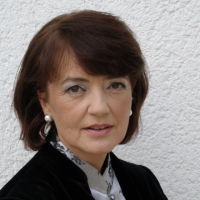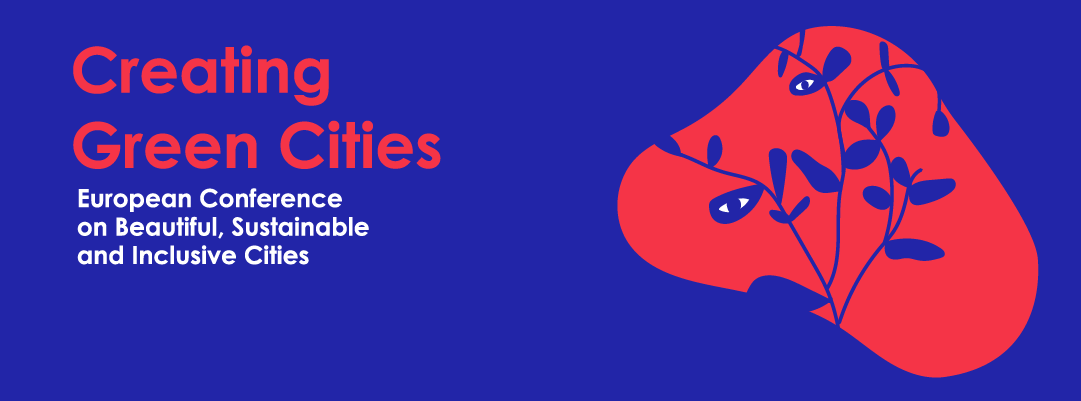Keynote speakers and panelists
Lučka Kajfež Bogataj
Lučka is professor for Climatology at the University of Ljubljana. Her areas of research include biometeorology, climate change impacts on ecosystems and human well-being. Her expertise as a climate scientist is internationally recognized and she was, as a member of Intergovernmental Panel on Climate Change (2002 – 2016), the joint recipient of the Nobel Peace Prize in 2007. She was also a member of the Steering Committee for the Global Climate Observation System at World Meteorological Organisation. In 2016 she became a member of the UNESCO Expert Group on the Declaration on Ethical Principles in Relation to Climate Change.
In her presentation Lučka Kajfež Bogataj will mention that the majority of the actions leading to global impacts originate in cities. Residents of cities are significant drivers of environmental degradation but on the other hand cities can also be more acutely impacted by global risks, from climate change to food security. These risks will increase and multiply in the future. It is high time for redesigning modern cities to cope with the contemporary environmental challenges. For maintaining Earth’s life-support systems it is inevitable that any given city develops ways in future from “business as usual” to far-reaching transformations. Sustainable pathway for cities and regions is planning within planetary boundaries.
Photo:

Eleni Myrivili
Eleni "Lenio" Myrivili is Global Chief Heat Officer to UN Habitat and the Arsht Rock Resilience Center, building heat resilience in cities around the world. Myrivili is senior advisor for urban heat and a senior fellow at the Arsht-Rock Center at the Atlantic Council. She is also a member of the EU Mission Board for Adaptation at the European Commission.
Myrivili served as elected Deputy Mayor for the City of Athens as well as Athens’ Chief Resilience Officer and as Athens’ Chief Heat Officer. She also co-chaired the Resilience Cities Network Steering Committee.
She holds a Ph.D. in Anthropology from Columbia Un and was a tenured professor for over a decade.
In her presentation Eleni Myrivili will speak about how cities can deal with heat waves, by sharing both inspiring examples and examples on policy level.
(C) Loeb Fellowship 2019-2020, GSD Harvard University

Lars Strannegård
Lars Strannegård is President of the Stockholm School of Economics and professor of business administration. He is also chairman of the board of the King's Foundation for Young Leadership and Stockholm's Academic Forum. He is a board member of Swedish Public Service Television Company SVT and Wanås Konst. Strannegård has also been a visiting scholar at Stanford University and professor at Uppsala University. During his time at the School of Economics, he has increased his commitment to art and culture and made several cross-border collaborations in an innovative and successful way.
What type of leadership is needed for creating green cities in a world facing pressing sustainability issues? How are we to educate in a world infused by artificial intelligence? In his presentation, Lars Strannegård explains how aesthetic experiences can be key to understanding others and to interpreting big-picture developments. The leadership of the future requires a combination of a science-based mindset, reflection, self-awareness, empathy, cultural literacy, creativity, and action-orientation. In his talk, Lars Strannegård exemplifies with the developments at Stockholm School of Economics, a leading European business school.
Photo: Juliana Wiklund

Cecil Konijnendijk van den Bosch
Cecil has over 25 years of experience studying, teaching, and advising on aspects of urban forestry and nature-based solutions. He has lived and worked in Europe, Asia, and North America. Cecil helped found the leading academic journal Urban Forestry & Urban Greening and edited seminal textbooks such as The Routledge Handbook of Urban Forestry. He is passionate about using trees and nature to develop better cities, and always stresses the importance of building meaningful relationships between people and places. He has advised international organisations such as the United Nations, as well as national and local governments in more than 30 countries. In 2020, Cecil co-founded the Nature Based Solutions Institute, a think tank for the evidence-based greening of cities. He is also an honorary professor of urban forestry at the University of British Columbia.

Patrick Child (TBC)
Patrick Child is the Deputy Director-General in DG Environment at the European Commission with particular responsibility for the EU’s zero pollution strategy, chemicals legislation, urban agenda, research and innovation for environment and communication. He is also the Mission Manager for the Climate-Neutral and Smart Cities Mission, which aims to reach 100 climate-neutral cities by 2030. During 2016-2021, he was Deputy Director-General in DG Research and Innovation (R&I) at the European Commission.

Olga Kordas
Olga Kordas is the Program Director for Viable Cities, which is a Swedish strategic innovation program for climate neutral and sustainable cities jointly funded by Formas, Vinnova and the Swedish Energy Agency. Viable Cities have been pioneering a mission driven approach to achieving climate neutral cities by 2030 together with Swedish cities, government agencies and are active in the cities mission at the European level. She is also associate professor in sustainable urban sustainable development at KTH Royal Institute of Technology. Her research involves urban transitions and innovation studies.

Darja Isaksson
Darja Isaksson is since 2018 Director General of Vinnova, Sweden’s national innovation agency. As founder of two design agencies, Darja has worked in business and product development for clients such as Sony Ericsson, IKEA, and Husqvarna. She has served as advisor to the Swedish Government in the Digitalization council as well as the Swedish Prime Ministers Innovation Council. She has been recognised as one of Sweden’s most powerful opinion-makers and was named one of the world’s 100 most influential people in the digital government.

Allan Larsson
Allan Larsson is the former chairperson of Viable Cities’ board of directors. He was also the former vice chairperson of the EU Mission Board for Climate Neutral and Smart Cities. He furthermore has an extensive background as a politician and in leading roles in Swedish national and European public institutions. Among other things he is a former finance minister of the Swedish Government.

Jordi Peris Blanes
Jordi Peris Blanes is currently General Coordinator of Urban Strategies and Sustainable Agenda in the Mayor's Office of València City Council. He coordinates the València 2030 Urban Strategy, the València 2030 Climate Mission and the València Green Capital 2024. Holding a PhD in project management and a background on engineering and political science, Jordi Peris Blanes is Tenured Professor at the Universitat Politècnica de València. His research has focused on the study of urban sustainability transitions with a focus on planning, innovation and governance processes.

Anders Almgren (TBC)
Anders Almgren is the Mayor of the city of Lund, which is one of 23 cities in Sweden acting as forerunners in accelerating the transition to climate neutral and sustainable cities 2030. Lund is also one of 112 cities within the EU mission on climate neutral and smart cities 2030 chosen to act as experimentation and innovation hubs to enable all European cities to follow suit by 2050. In 2022 Lund was awarded first place in the WWF One Planet City Challenge. Over 280 cities from the entire world participated and Lund was elected winner, together with Bogotá. Lund has ambitious climate goals and programmes and the Climate Policy Council reviews Lund’s work with climate impact.

Salvador Rueda
Salvador Rueda obtained a degree in Biological Science from the University of Barcelona. He also has a degree in Psychology from the University of Barcelona, as well as a diploma in Environmental Engineering from the Spain’s Ministry of Industry and Energy and Spanish Research Universities. In addition, he has a diploma in Energy Management from the Polytecnic University of Catalunya. He is currently the Director of the Ecologia Urbana Agency since its creation in 2000.
In his presentation Salvador Rueda will present the Superblocks in Barcelona as a model for reinventing urban space and making it more livable, greener, and healthier.

Anab Jain
Anab is a designer, filmmaker, futurist and educator. She believes that a rigorous praxis of imagination and experiential storytelling can emotionally connect us with plural futures – enabling us to make better decisions today. This belief and commitment led her to establish the speculative design and experiential futures practice Superflux in partnership with Jon Ardern. Working for a diverse set of clients and commissioners, Superflux imagines and builds future worlds we can experience in the present moment. By creating new ways of seeing, being and acting, their work inspires and challenges us to look critically at the decisions and choices we make today. Anab recently received the title of RDI - Royal Designer for Industry in Speculative Design from the Royal Society of Arts, Manufacturing and Commerce. She serves as Professor of Design Investigations, University of Applied Arts, Vienna, a program and advocates a planetary, more-than-human approach in all aspects of her work.
In her presentation Anab Jain will share her view on how the life in the Green City will look like in the future.

Helena Bjarnegård
Helena Bjarnegård is Sweden's national architect. She is leading the work within the field of architecture nationally, providing a structure that supports those planning and building in Sweden to create well-designed towns and cities. The responsibility of the national architect is to embody the vision of the Swedish government´s national policy for architecture, art and culture heritage to create more sustainable, equal living environments, now and in the future.
The national architect is also the chair of the Council for Sustainable Cities, a group that brings together the directors of a unique mix of government authorities whose work is affected by questions of design and environmental sustainability.
Foto: Hanna Franzén/FotoFranzén

